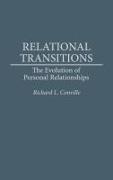Read more
In this practical and innovative study, Richard Conville proposes a way to think about the process of communication in personal relationships. He moves beyond rigid stage models of relational development and advocates a new, helical model with a four-phase structure of transition between relational phases. The model is based on Difference--developed as a theoretical concept--and on structural analysis of relational partners' narratives of their transition experiences. This perspective offers both a conceptual and a methodological alternative to current work in relationship development. Though its focus is only one part of the wide-ranging communication field, its principles can easily be applied to other communication contexts.
Conville opens with a description of Difference, a necessary component of current theory in interpersonal relationships, and its role in the structure of relationships. He examines narratives by partners in three personal relationships to locate dialectical differences of time, intimacy, and affect. Later chapters examine the four transition phases of relationships: security, disintegration, alienation, and resynthesis. These four phases are seen as meta-dialectics that mark the social domain in which personal relationships are played out.
Relational Transitions will prove to be of particular interest to scholars and students of communication, psychology, sociology, family studies, and anthropology.
List of contents
Preface
The Ubiquity of Difference: They Saw a Game
Transition and Difference in Relationships: With New Eyes
Structural Analysis of Relationship Transitions: Similar Differences
From Description to Explanation in Relationship Transition: Repititive without Repeating
Relationship Security: Fitting Relations
Relationship Disintegration: Taking Notice
Relationship Alienation: Still Life
Relationship Resynthesis: Homo Relatio
Prospect: Via
Appendixes
References
Index
About the author
RICHARD L. CONVILLE is Professor of Speech Communication at the University of Southern Mississippi. He is the author of many scholarly articles and the book
Relational Transitions (Praeger, 1991).

